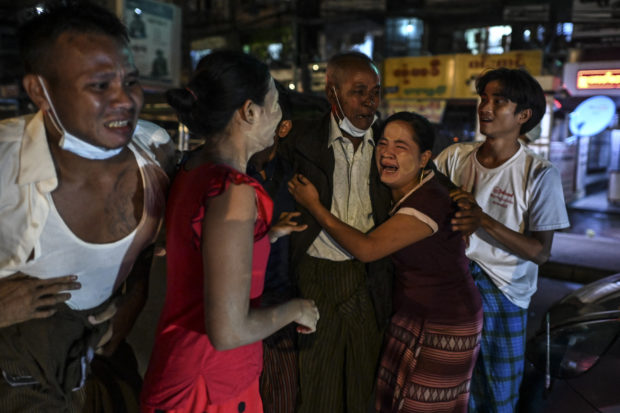Relatives crowd prison after Myanmar junta protester amnesty

A man (C) is reunited with his family members outside the Insein Prison following his release in Yangon on October 18, 2021, after authorities announced more than 5,000 people jailed for protesting against a February coup which ousted the civilian government would be released. AFP
YANGON — Family members of Myanmar’s pro-democracy prisoners crowded outside a jail Tuesday, hoping their relatives would be among thousands the junta has promised to release as it faces growing international pressure.
The Southeast Asian country has been in chaos since a coup in February, with more than 1,100 civilians killed in a bloody crackdown on dissent and more than 8,000 arrested, according to a local monitoring group.
On Monday, the junta said it would free more than 5,000 to mark the three-day Buddhist Thadingyut festival, sending anxious families rushing to the colonial-era Insein prison in Yangon, joyful at the prospect of reunions after months apart.
Several buses left the prison, with those inside giving thumbs up gestures to a cheering crowd, some of whom flashed the three-finger salute — a popular protest symbol.
Factory worker Kyi Kyi was one of dozens waiting outside the prison early Tuesday, hoping to see her husband, who was arrested in February.
Article continues after this advertisement“I also came here yesterday,” she told AFP.
Article continues after this advertisement“He was not released. Hopefully, he will be today.”
Nwet Nwet San, said he was hoping his son, a soldier who had run away from the army, would be freed.
“He’s been in prison for eight months,” he told AFP.
“I heard mostly protesters will be released. I also heard other criminals will be released as well. That’s why I’m waiting.”
Asean snub
Myanmar authorities released more than 2,000 anti-coup protesters from prisons across the country in June, including journalists critical of the military government.
Those still in custody include the American journalist Danny Fenster, who has been held since being arrested on May 24.
The latest and larger release comes with the junta under increasing pressure to engage with its opponents, nearly nine months after seizing power.
On Friday, the Association of Southeast Asian Nations decided to exclude junta leader Min Aung Hlaing from an upcoming summit of the 10-country bloc because of doubts about his administration’s commitment to defusing the bloody crisis.
The organization, often criticized as toothless, took a stand after the junta rebuffed requests for a special envoy to meet “all stakeholders” in Myanmar — a phrase seen to include ousted civilian leader Aung San Suu Kyi.
The coup snuffed out Myanmar’s short-lived experiment with democracy and the 76-year-old Suu Kyi now faces a raft of charges in a junta court that could see her jailed for decades.
Last week, her chief lawyer said he had been banned by the junta from speaking to journalists, diplomats or international organizations.
The other lawyers on her legal team also face a similar ban — effectively muzzling the key sources of information on court proceedings, from which journalists are barred.